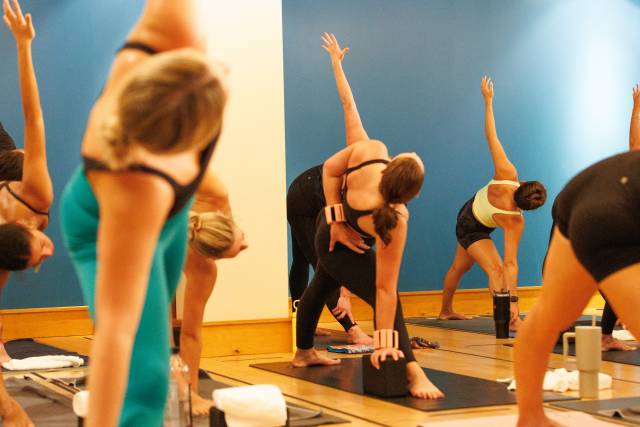In our fast-paced world, getting a good night’s sleep can often feel like an elusive dream. Many of us find ourselves tossing and turning, unable to quiet our minds as we replay the day’s events or worry about tomorrow’s to-do list. However, there’s a gentle and effective solution that combines Yoga & Mindfulness for Improved Sleep Quality. By incorporating mindful yoga into your evening routine, you can create a peaceful transition from the busyness of the day to a restful night’s sleep.
The Connection Between Yoga & Mindfulness for Improved Sleep Quality
Yoga and mindful living are both ancient practices that have stood the test of time, offering numerous benefits for both physical and mental well-being. When it comes to sleep, these practices can be particularly beneficial.
Yoga helps to relax the body by releasing physical tension and promoting flexibility. Many yoga poses are designed to activate the parasympathetic nervous system, which is responsible for the body’s rest and digest response. This activation can help lower heart rate, reduce blood pressure, and create a sense of calm in the body.
Mindfulness, on the other hand, focuses on calming the mind. By bringing attention to the present moment and observing thoughts without judgment, mindfulness can help quiet the mental chatter that often keeps us awake at night. It teaches us to let go of worries about the future and regrets about the past, allowing us to settle into a more peaceful state conducive to sleep.
When combined, yoga and mindfulness create a powerful synergy that addresses both the physical and mental aspects of sleep preparation. This holistic approach can lead to improved sleep quality, helping you fall asleep faster and enjoy deeper, more restorative rest.
Creating a Mindful Yoga Bedtime Routine
Establishing a consistent bedtime routine is key to improving sleep quality. By incorporating mindful yoga into this routine, you can create a soothing transition from your day to your night. A gentle evening routine that combines yoga and mindfulness to prepare your body and mind for sleep might look something like this:
Begin by creating a calm environment. Dim the lights, perhaps light a candle or use essential oils like lavender known for their sleep-promoting properties. Ensure your space is quiet and free from distractions. Start with a few minutes of deep, mindful breathing. Sit comfortably and focus on your breath, noticing the sensation of each inhale and exhale. This simple practice can help slow down your heart rate and calm your mind.
Move into some gentle yoga poses that focus on releasing tension from the body. Child’s pose, cat-cow stretches, and gentle twists can help relax the spine and release any physical stress you’ve been holding onto throughout the day. The restorative legs-up-the-wall yoga pose is excellent for promoting relaxation and improving circulation. Lie on your back with your legs extended up a wall. Stay here for 5-10 minutes, focusing on your breath and letting go of any remaining tension in your body.
Next, try a mindful body scan. Lie in a comfortable position and slowly scan your body from head to toe. Notice any areas of tension and consciously relax them. This practice combines mindfulness with progressive muscle relaxation, promoting both physical and mental relaxation. End your practice with a short, guided relaxation or meditation. You can use a recorded meditation or simply lie in savasana (corpse pose) and focus on your breath, allowing yourself to drift into a state of deep relaxation.
Mindfulness Techniques for Better Sleep
In addition to the physical practice of yoga, incorporating mindfulness techniques into your bedtime routine can significantly improve your sleep quality. Consider including a gratitude practice, taking a few moments to reflect on things you’re grateful for from your day. This positive focus can help shift your mind away from stress or worry.
Mindful observation can be another helpful technique. Choose an object in your room and observe it in detail for a few minutes. This practice anchors you in the present moment and can help quiet a busy mind. You might also try a loving-kindness meditation, practicing sending feelings of love and kindness to yourself and others. This can create a sense of peace and connection that’s conducive to restful sleep.
Mindful listening is another valuable practice. Pay attention to the sounds around you without judging them. This can help you become less reactive to noises that might otherwise disturb your sleep.
Making Mindful Yoga a Consistent Part of Your Sleep Routine
Consistency is key when it comes to improving sleep quality. To make mindful yoga a regular part of your evening routine, start small. Begin with just 10-15 minutes of practice each night. As you experience the benefits, you may naturally want to extend your practice time.
While consistency is important, be gentle with yourself. If you miss a night, simply return to your practice the next evening without judgment. Pay attention to which poses and mindfulness techniques work best for you. Everyone’s body and mind are different, so feel free to adapt the routine to suit your needs.
To help you remember your practice, consider setting a gentle alarm or placing your yoga mat in a visible spot as a reminder to practice each evening. Be patient with yourself as you establish this new routine. Improving sleep patterns takes time, so give yourself at least a few weeks of consistent practice before evaluating the effects on your sleep quality.
Evening Yoga Routine to Release Stress and Improve Sleep Quality
By incorporating mindful yoga into your evening routine, you’re giving yourself a beautiful gift – the opportunity to release the stresses of the day, quiet your mind, and prepare your body for restful sleep. This practice not only can improve your sleep quality but also enhance your overall well-being, allowing you to wake up feeling refreshed and ready to face a new day.
Above all, be kind to yourself as you explore these practices, and allow yourself to enjoy the process of creating a more peaceful transition to sleep each night. Sweet dreams!







